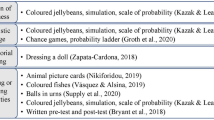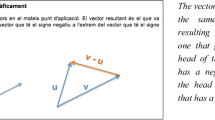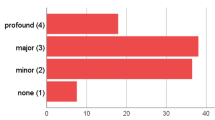Abstract
Although teachers’ professional knowledge and instructional beliefs are known to have a variety of subcomponents, research on the structure and interrelations of these subcomponents is relatively scarce. This article presents some findings of a preliminary, quantitative empirical study examining the relationships between mathematics teachers’ views concerning specific classroom situations, their content domain-specific pedagogical content beliefs and their more global instruction-related beliefs. The findings suggest that global beliefs—in terms of cognitive constructivist or direct transmission views of teaching and learning, on the one hand, and beliefs about the stability of individual mathematical abilities, on the other—can impact teachers’ content domain-specific beliefs and their views related to videotaped classroom situations from introductory lessons on geometrical proof.



Similar content being viewed by others
References
Adler, J., Ball, D., Krainer, K., Lin, F., & Novotna, J. (2005). Reflections on an emerging field: Researching mathematics teacher education. Educational Studies in Mathematics, 60, 359–381.
Ball, D. (2000). Bridging practices: Intertwining content and pedagogy in teaching and learning to teach. Journal of Teacher Education, 51(3), 241–247.
Ball, D., Thames, M. H., & Phelps, G. (2008). Content knowledge for teaching: What makes it special? Journal of Teacher Education, 59(5), 389–407.
Baumert, J., Lehmann, R., Lehrke, M., Schmitz, B., Clausen, M., Hosenfeld, I., Köller, O., & Neubrand, J. (1997). TIMSS—mathematisch-naturwissenschaftlicher Unterricht im internationalen Vergleich. Deskriptive Befunde. Opladen: Leske & Budrich.
Boero, P. (1999). Argumentation and mathematical proof: A complex, productive, unavoidable relationship in mathematics and mathematics education. Int. Newsletter on the Teaching and Learning of Math. Proof, 7–8.
Bromme, R. (1992). Der Lehrer als Experte. Zur Psychologie des professionellen Wissens. [The teacher as an expert. On the psychology of professional knowledge]. Bern: Hans Huber.
Bromme, R. (1997). Kompetenzen, Funktionen und unterrichtliches Handeln des Lehrers. [Competencies, functions and instruction-related actions of teachers]. In F. Weinert (Ed.), Enzyklopädie der Psychologie: Psychologie des Unterrichts und der Schule. [Encyclopedia of Psychology: Psychology of instruction and school]. (pp. 177–212). Göttingen: Hogrefe.
Biza, I., Nardi, E., & Zachariades, T. (2007). Using tasks to explore teacher knowledge in situation-specific contexts. Journal of Mathematics Teacher Education, 10, 301–309.
Cai, J., Kaiser, G., Perry, B., & Wong, N.-Y. (Eds.). (2009). Effective mathematics teaching from teachers’ perspectives: National and cross-national studies. Rotterdam: Sense Publishers.
Chick, H., Baker, M., Pham, T., & Cheng, H. (2006). Aspects of teachers’ pedagogical content knowledge for decimals. In J. Novotná, H. Moraová, M. Krátká, & N. Stehlíková (Eds.), Proceedings of the 30th Conference of the International Group for the Psychology of Mathematics Education (PME) (Vol. 2, pp. 297–304). Prague: Charles University.
Clarke, D. (2006). Using international research to contest prevalent oppositional dichotomies. Zentralblatt für Didaktik der Mathematik (ZDM), 38(5), 376–387.
Clausen, M., Reusser, K., & Klieme, E. (2003). Unterrichtsqualität auf der Basis hoch-inferenter Unterrichtsbeurteilungen: ein Vergleich zwischen Deutschland und der deutschsprachigen Schweiz [Using high-inference ratings to assess quality of instruction. A comparison between Germany and the German-speaking part of Switzerland]. Unterrichtswissenschaft, 31(2), 122–141.
Ernest, P. (1993). Constructivism, the psychology of learning, and the nature of mathematics: Some critical issues. Science Education, 2(2), 87–93.
Escudero, I., & Sanchez, V. (1999). The relationship between professional knowledge and teaching practice: The case of similarity. In O. Zaslavsky (Ed.), Proceedings of the 23rd Conference of the International Group for the Psychology of Mathematics Education (Vol. 2, pp. 305–312). Haifa: PME.
Fennema, E., Carpenter, T. P., & Loef, M. (1990). Teacher belief scale: Cognitively guided instruction project. Madison: University of Wisconsin.
Hanna, G. (1983). Rigorous proof in mathematics education. Toronto: OISE Press.
Hanna, G. (2000). Proof, explanation and exploration: An overview. Educational Studies in Mathematics, 44, 5–23.
Hiebert, J., Gallimore, R., & Stigler, J. (2002). A knowledge base for the teaching profession: What would it look like and how can we get one? Educational Researcher, 31(5), 3–15.
Kuntze, S. (2006). Video technology in the assessment of an in-service teacher learning program—Differences in mathematics teachers’ judgements on instructional quality. Zentralblatt für Didaktik der Mathematik (ZDM), 38(5), 413–2421.
Kuntze, S. (2008). Fostering geometrical proof competency by student-centred writing activities. In O. Figueras, J. L. Cortina, S. Alatorre, T. Rojana, & A. Sepúlveda (Eds.), Proceedings of the Joint Meeting of PME32 and PME-NA XXX (Vol. 3, pp. 289–296). Morelia: Cinvestav-UMSNH.
Kuntze, S., Lerman, S., Murphy, B., Kurz-Milcke, E., Siller, H.-S. Winbourne, P. (2011). Professional knowledge related to big ideas in mathematics—An empirical study with pre-service teachers. CERME (in press)
Kuntze, S., Lipowsky, F., Krammer, K., & Reiss, K. (2008). What is “best practice” for video-based in-service teacher trainings? Views and experiences of secondary mathematics teachers and findings from evaluation research. Proceedings of the 11th International Congress on Mathematical Education (ICME 11). Available from: http://dg.icme11.org/document/get/149.
Kuntze, S., Rechner, M., & Reiss, K. (2004). Inhaltliche Elemente und Anforderungsniveau des Unterrichtsgesprächs beim geometrischen Beweisen. Eine Analyse videografierter Unterrichtsstunden. [Content elements and level of complexity of classroom interactions related to geometrical proof - an analysis of videotaped lessons]. Mathematica Didactica, 27(1), 3–22.
Kuntze, S., & Reiss, K. (2004). Unterschiede zwischen Klassen hinsichtlich inhaltlicher Elemente und Anforderungsniveaus im Unterrichtsgespräch beim Erarbeiten von Beweisen—Ergebnisse einer Videoanalyse. [Differences in argumentation and proof in german classrooms—Results of a video-based study]. Unterrichtswissenschaft, 32(4), 357–379.
Kuntze, S., & Reiss, K. (2006). Evaluational research on a video-based in-service mathematics teacher training project—Reported instructional practice and judgements on instructional quality. In J. Novotná, H. Moraová, M. Krátká, & N. Stehlíková (Eds.), Proceedings of the 30th Conference of the International Group for the Psychology of Mathematics Education (PME) (Vol. 4, pp. 1–8). Prague: Charles University.
Kuntze, S., & Rudolph-Albert, F. (2009). What is “good” mathematics instruction? Mathematics teachers’ individual criteria for instructional quality and attributions for instructional success. In J. Cai, G. Kaiser, B. Perry, & N.-Y. Wong (Eds.), Effective mathematics teaching from teachers’ perspectives: National and cross-national studies (pp. 71–92). Rotterdam Boston Taipei: Sense Publishers.
Kuntze, S., & Zöttl, L. (2008). Überzeugungen von Lehramtsstudierenden zum Lernpotential von Aufgaben mit Modellierungsgehalt. [Convictions of prospective teachers regarding the learning potential of modelling tasks]. Mathematica Didactica, 31, 46–71.
Leder, G. C., Pehkonen, E., & Törner, G. (Eds.). (2002). Beliefs: A hidden variable in mathematics education? Dordrecht: Kluwer.
Leinhardt, G., & Greeno, J. (1986). The cognitive skill of teaching. Journal of Educational Psychology, 78, 75–95.
Lerman, S. (1986). Alternative views of the nature of mathematics and their possible influence on the teaching of mathematics. Unpublished PhD dissertation. London: King’s College (KQC).
Lerman, S. (1990). Alternative perspectives of the nature of mathematics and their influence on the teaching of mathematics. British Educational Research Journal, 16(1), 53–61.
Lerman, S. (2001). A review of research perspectives on mathematics teacher education. In F.-L. Lin & T. J. Cooney (Eds.), Making sense of mathematics teacher education (pp. 33–52). Dordrecht: Kluwer.
Leung, F., Graf, K.-D., & Lopez-Real, F. (Eds.). (2006). Mathematics education in different cultural traditions. New York: Springer.
Lin, F.-L., & Cooney, T. J. (Eds.). (2001). Making sense of mathematics teacher education. Dordrecht: Kluwer.
Lipowsky, F., Thußbas, C., Klieme, E., Reusser, K., & Pauli, C. (2003). Professionelles Lehrerwissen, selbstbezogene Kognitionen und wahrgenommene Schulumwelt—Ergebnisse einer kulturvergleichenden Studie deutscher und Schweizer Mathematiklehrkräfte: [Professional teacher knowledge, self-related cognitions and perceived school environment—Results of a cross-culture study of German and Swiss mathematics teachers]. Unterrichtswissenschaft, 31(3), 206–237.
Malara, N. (2003). Dialectics between theory and practice: Theoretical issues and aspects of practice from an early algebra project. In N. Pateman et al. (Eds.), Proceedings of the 27th Conference of the International Group for the Psychology of Mathematics Education (pp. 33–48). Honolulu: PME.
Mason, J. (1998). Enabling teachers to be real teachers: Necessary levels of awareness and structure of attention. Journal of Mathematics Teacher Education, 1(3), 243–267.
McLeod, D. B. (1989). Beliefs, attitudes and emotions: New views of affect in mathematics education. In D. B. McLeod & V. M. Adams (Eds.), Affect and mathematical problem solving. A new perspective (pp. 245–258). New York: Springer.
Pajares, F. M. (1992). Teachers’ beliefs and educational research: Cleaning up a messy construct. Review of Educational Research, 62(3), 307–332.
Pehkonen, E. (1994). On teacher’s beliefs and changing mathematics teaching. Journal für Mathematik-Didaktik, 15(3/4), 177–209.
Pehkonen, E., & Törner, G. (1999). Mathematical beliefs and their impact on teaching and learning of mathematics. Duisburg: University.
Peterson, P., Fennema, E., Carpenter, T. P., & Loef, M. (1989). Teacher’s pedagogical content beliefs in mathematics. Cognition and Instruction, 6, 1–40.
Petko, D., Waldis, M., Pauli, C., & Reusser, K. (2003). Methodologische Überlegungen zur videogestützten Forschung in der Mathematikdidaktik. [Methodological thoughts concerning video-based teacher training in mathematics education]. Zentralblatt für Didaktik der Mathematik (ZDM), 35(6), 265–281.
da Ponte, J. P. (2001). Investigating mathematics and learning to teach mathematics. In F.-L. Lin & T. J. Cooney (Eds.), Making sense of mathematics teacher education (pp. 33–52). Dordrecht: Kluwer.
Sherin, M. G. (2003). Using video clubs to support conversations among teachers and researchers. Action in Teacher Education, 24(4), 33–45.
Shulman, L. (1986a). Paradigms and research programs in the study of teaching: A contemporary perspective. In M. Wittrock (Ed.), Handbook of research on teaching (pp. 3–36). New York: Macmillan.
Shulman, L. (1986b). Those who understand: Knowledge growth in teaching. Educational Researcher, 15(2), 4–14.
Shulman, L. (1987). Knowledge and teaching: Foundations of the new reform. Harvard Educational Review, 57(1), 1–22.
Staub, F., & Stern, E. (2002). The nature of teacher’s pedagogical content beliefs matters for students’ achievement gains: Quasi-experimental evidence from elementary mathematics. Journal of Educational Psychology, 94(2), 344–355.
Stipek, D., Givvin, K., Salmon, J., & MacGyvers, V. (2001). Teachers’ beliefs and practices related to mathematics instruction. Teaching and Teacher Education, 17, 213–226.
Sullivan, P., & Mousley, J. (2001). Thinking teaching: Seeing mathematics teachers as active decision makers. In F.-L. Lin & T. J. Cooney (Eds.), Making sense of mathematics teacher education (pp. 33–52). Dordrecht: Kluwer.
Tillema, H. (2000). Belief change towards self-directed learning in student teachers: Immersion in practice or reflection on action. Teaching and Teacher Education, 16, 575–591.
Törner, G. (2002). Mathematical beliefs—A search for a common ground: Some theoretical considerations on structuring beliefs, some research questions, and some phenomenological observations. In G. Leder, E. Pehkonen, & G. Törner (Eds.), Beliefs: A hidden variable in mathematics education? (pp. 73–94). Dordrecht: Kluwer.
Wholhuter, K. A. (1997). The geometry classroom: The influence of teachers’ beliefs. Proceedings of PME-NA, 19(2), 459–463.
Acknowledgements
We would like to thank the Robert Bosch Stiftung (Stuttgart, Germany) for support of the study.
Author information
Authors and Affiliations
Corresponding author
Rights and permissions
About this article
Cite this article
Kuntze, S. Pedagogical content beliefs: global, content domain-related and situation-specific components. Educ Stud Math 79, 273–292 (2012). https://doi.org/10.1007/s10649-011-9347-9
Published:
Issue Date:
DOI: https://doi.org/10.1007/s10649-011-9347-9




